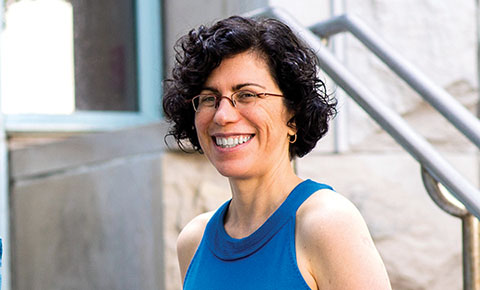Coburn Honored With Excellence in Teaching Award

Cynthia Coburn has been awarded the Charles Deering McCormick University Professorship of Teaching Excellence Award for her innovative classroom instruction, the compassion and care she has shown undergraduates, and her pioneering contributions to the field of education research.
Coburn, professor of education and social policy and a member of the prestigious National Academy of Education, has helped turn Northwestern University’s social policy program into one of the strongest in the nation. At the same time, she has inspired students to pursue careers they never imagined, helped them with mental health and personal growth issues, and ignited a love of research.
“She has the key traits of a great teacher: a supportive attitude, high expectations, and creative classroom curricula design,” said SESP alumna Reena Burt, who credits Coburn with laying the foundation for a career in policy analysis. “My time in Professor Coburn’s class made me a stronger communicator, policy analyst, and team player.”
Coburn joins SESP faculty members Mesmin Destin (2019), Danny M. Cohen (2019), David Rapp (2015) and Dan McAdams (1995) as winners of this exceptional honor. She has now earned high University-wide honors in successive years in both teaching and research. Last year, Cynthia was awarded the 2020 Clarence Ver Steeg Distinguished Research Fellowship Award, following a three-year period in which she supervised seven major research studies.
Her exceptional growth was reflected not only in the grant dollars she brought to Northwestern, but also in the burgeoning staff of undergraduates, graduate students, postdoctoral researchers, and full-time research professionals who she supervised and mentored.
A world-renowned expert on improving relationships between educational researchers and practitioners such as teachers, principals, and district leaders, Coburn’s work has helped spark a renaissance in the field of education research. She is best known for her research uncovering the complicated factors and relationships that affect how urban school systems implement educational policy.
Coburn often works with the Office of Undergraduate Research as a grant reviewer, a mentor for student research grants (she’s worked with 13 students through the Undergraduate Research Assistant program alone), and a poster judge for the Undergraduate Research Expo.
She actively recruits and retains underrepresented students and offers undergraduates research experiences through independent studies and the Institute for Policy Research Summer Research program. During her career as a professor, she’s worked with more than 50 undergraduates in apprenticeship roles, using a model that exposes students to the research process and supports their analysis, synthesis, and interpretation skills.
“Coburn provides quality mentored research experiences, including students with limited prior experience,” said Megan Wood, associate director of undergraduate research at Northwestern. “She thoughtfully scaffolds in student learning in both one-on-one and group settings. Students gain training in mixed-methods research, which is highly sought after in both academia and industry.”
She also fosters a supportive environment where making mistakes is part of learning, Wood said. “Her students learn the importance of taking risks and putting ideas out for feedback and refinement, which is critical in developing as a scholar.”
“Professor Coburn’s influence on my academic and professional trajectory cannot be emphasized enough,” added Nina Wetoska, a research assistant on one of Coburn’s projects. “I now have a clear vision and understanding of what I want to do with my career, thanks to her initial leap of faith in my abilities.”
In 2013, when Coburn first arrived at Northwestern, she immediately bolstered the social policy curriculum after a student-led task force identified gaps in the coursework. In particular, students wanted real-world policymaking experience and the ability to write effective policy briefs.
Coburn designed and taught a new required social policy course– SOC POL 312, Social Policy and Implementation–which focuses on researching, analyzing, and synthesizing information to give students a deep understanding of the issue and the audience. Student teams tackle “a challenging, consequential, and timely issue,” such as police misconduct in Chicago. The class effectively helps students learn how to create a brief by setting a series of small, achievable milestones.
By the end of the quarter, students with little-to-no experience writing policy briefs are able to create rigorous and professional oral and written presentations.
Coburn, who rarely lectures, stresses the importance of critical thinking and context during discussions on the reading or policy issues, which students say makes the ideas “stick.” Her assessment techniques provide immediate feedback which allow her to tailor the course to students’ interests and abilities.
“Her classroom is supportive – she understands that students need direction. But she is also confident that we can rise to challenges, an attitude that adds rigor to her course and allows students to grow intellectually and personally,” Burt said. “She treated us with intellectual respect.”
Burt quickly used her newfound policy brief writing skills when four of her applications for jobs and fellowships required analyzing a current state or city policy issue. “Her teaching method was not about memorization or regurgitation; she focused on building lasting critical policy analysis skills,” Burt said.